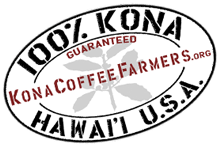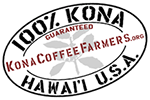Coffee Growers and Roasters in Hawaii:
SUBJECT: Notice of Board of Agriculture Designation of Island of Oahu as Expanded Coffee Berry Borer, Hypothenemus hampei, Infested Area Subject to Quarantine Restrictions to Prevent Movement of the Coffee Berry Borer, Coffee Plants and Plant Parts, Unroasted Coffee Beans, Used Coffee Bags, and Coffee Harvesting Equipment, to Prevent the Spread of the Coffee Berry Borer
This notice is to inform you that on February 24, 2015, the Board of Agriculture (Board) voted to expand the designated coffee berry borer (CBB), Hypothenemus hampei, infested areas on Oahu from Waialua Estate Coffee Farms and the Waialua Sugar Mill to the entire island of Oahu. The Board’s designation of the island of Oahu as an expanded CBB-infested area authorizes the Hawaii Department of Agriculture (HDOA), Plant Quarantine Branch (PQB) to implement quarantine measures to restrict the movement of coffee and other CBB hosts from all areas on Oahu.
The designation of a CBB infested area may be expanded by the Board to implement quarantine measures to prevent further spread of CBB and its plant or commodity hosts from the designated expanded area of infestation to restricted (uninfested) areas. (Sections 4-72-12(e) and 4-72-4.5(a), Hawaii Administrative Rules (HAR).) On December 16, 2014, based on confirmation of the presence of CBB, the Board designated the Waialua Estate Coffee Farms and the Old Waialua Sugar Mill as expanded CBB infested areas subject to the same quarantine restriction to prevent the movement of CBB that apply to the island of Hawaii under section 4-72-12, HAR. Due to recent findings of CBB in two new Oahu locations, Wahiawa and Poamoho, it was determined that an island wide quarantine for Oahu is necessary to prevent the further spread of CBB to other islands not known to have this destructive pest.
The Board’s designation of Oahu as an expanded CBB infested area means that coffee and related CBB host material from Oahu are subject to the quarantine restrictions specified in section 4-72-12, HAR, (Restrictions on coffee), just Hawaii island has been subject to these restrictions since December 2010. These quarantine measures also restrict the movement of coffee plants and plant parts, green (unroasted) coffee beans, used coffee bags, and coffee harvesting equipment from a quarantine area to a restricted (non-infested) area.
The Board’s designation of Oahu as an expanded CBB infested area becomes effective the day following the Board’s action, in this case, on February 25, 2015. Notice of the Board’s action, including its effective date, will be posted by the following day on HDOA’s website and, within twelve days of the Board’s action, will be given in a daily or weekly publication of statewide circulation or in separate daily or weekly publications whose combined circulation is statewide.
Chapter 4-72, HAR, Plant Intrastate Rules, also requires that any pest defined in section 150A-2, Hawaii Revised Statutes, shall not be transported between the islands unless it has been subjected to an appropriate treatment that exterminates the pest, as approved by PQB chief. The chief may, however, authorize the transportation of an untreated infested commodity to an island where the pest is known to establish. Under the Board’s designation of Oahu as an expanded CBB infested area, the movement of green (unroasted) coffee and the other above-mentioned CBB hosts between CBB infested areas, i.e., between Hawaii and Oahu, will require a permit.
The quarantine restrictions as stated in chapter 4-72, (HAR), are the same as those which have been in effect for coffee from Hawaii island since December 2010 by interim rule, as modified in minor part by the permanent rule, section 4-72-12, (HAR) in February 2012. The quarantine restrictions require a permit from HDOA to transport unroasted coffee beans, coffee plants and plant parts, used coffee bags and coffee harvesting equipment from a CBB-infested island or area to other non-infested areas or islands to prevent CBB movement. The rules also require certain treatment and inspection by HDOA Plant Quarantine inspectors prior to shipping. For unroasted coffee beans, acceptable treatment protocols include fumigation, freezing and heat treatment. Inspectors will either attach a tag, label or stamp to indicate the shipment passes inspection requirements. The coffee beans must also be roasted at a facility that is at least five miles from any commercial coffee-growing area. The rules can be found online at: http://hdoa.hawaii.gov/wp-content/uploads/2012/12/4-72-HAR-2012.pdf.
If you need more information about the quarantine or permit requirements, please call Mr. Lance Sakaino, Acting Plant Quarantine Specialist, at 808-832-0566 or email to: HDOA.PQSPEC@hawaii.gov.
Sincerely,
Neil Reimer, Plant Industry Administrator

